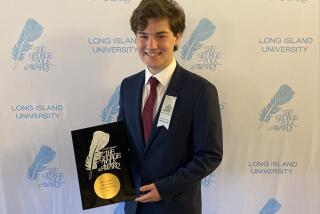CSFB Ousts CEO Amid Government Probe
- Share via
Stung by a deepening government investigation into its U.S. operations, Credit Suisse Group ousted the head of its investment banking unit Thursday and replaced him with a well-respected Wall Street veteran.
The No. 2 Swiss bank removed Allen Wheat as chief executive of its Credit Suisse First Boston brokerage operation and named John Mack, the former president of Morgan Stanley, in his place.
The move opens a new chapter for CSFB, which has been at the center of a federal probe into how Wall Street allocated hot initial public stock offerings during the technology stock boom of 1998-2000. Wheat’s ouster also raises questions about the tenure of other CSFB executives.
The Securities and Exchange Commission and the U.S. attorney’s office in Manhattan are investigating whether CSFB and other major brokerages received kickbacks for dishing out shares of hot IPOs. The National Assn. of Securities Dealers also has told CSFB and at least six of its employees that they might be charged with violations of industry rules.
Wheat, 53, presided over a period of strong growth during his four years as CEO and is credited with helping turn CSFB into a major force in investment banking, particularly in tech stocks.
But CSFB also was plagued with a series of regulatory infractions in the U.S. and in countries such as Japan and Sweden during Wheat’s tenure, bringing unwanted publicity to the firm.
“There’s no doubt that this IPO investigation, together with the problems in Sweden and Japan and [elsewhere], have left Mr. Wheat constantly explaining why he’s always being asked to explain things,” said Roy Smith, a former Goldman Sachs partner now at New York University.
“He has lost the confidence of his board of directors, and the IPO thing may very well have been the last straw.”
Lukas Muehlemann, Credit Suisse chairman, said Thursday the IPO probe had “absolutely nothing” to do with Wheat’s abrupt departure, adding that the firm jumped at the chance to hire Mack.
Still, Wheat becomes the highest-ranking casualty yet in the IPO furor. CSFB has denied wrongdoing, but the firm last month fired three San Francisco brokers who it said violated internal policies--though CSFB didn’t spell out exactly what they did wrong.
In forcing out Wheat, Credit Suisse may be trying to curry favor with regulators by giving the impression that the firm has replaced those responsible for any violations, analysts said. Yet some experts doubted that Wheat’s exit would influence investigators.
“Allen Wheat wasn’t handing out IPOs,” one analyst said. “It would be a joke [for CSFB] to say, ‘We got rid of the problem.’ ”
Besides the IPO probe, other forces contributed to Wheat’s demise, analysts said. He was criticized for lax supervision that may have contributed to CSFB’s regulatory problems.
Also, Wheat spearheaded CSFB’s purchase last year of rival Donaldson, Lufkin & Jenrette, a deal now viewed by some critics as having been ill-timed. Under Wheat, CSFB also has been criticized for doling out overly lavish compensation packages to executives.
Mack, 56, spent 27 years at Morgan Stanley, eventually becoming its No. 2 executive after the firm’s 1997 merger with Dean Witter. Mack left Morgan early this year after losing a power struggle with Philip Purcell, Morgan’s chief executive.
Mack is known as an accomplished manager who commands fierce loyalty among his employees. In contrast to Wheat, Mack probably will exhibit greater authority over CSFB’s strong-willed investment-banking group, analysts said.
Indeed, one of Mack’s first acts may be to turn his attention to star investment banker Frank Quattrone and his team.
Thanks to close ties with a slew of Silicon Valley leaders, Quattrone built an enormously profitable business bringing fledgling tech companies public through CSFB. But though the firm has consistently defended Quattrone, the three fired CSFB brokers had worked in his group.
Some analysts speculated Thursday that Quattrone might clash with Mack, for whom he previously worked at Morgan Stanley. In 1996, Quattrone fled Morgan Stanley after Mack rejected his bid for greater autonomy.
Others, however, said they believe that the two men can co-exist. Though tech stocks are out of favor for now, Mack must prize the huge profits that Quattrone’s group has generated, analysts said.
“He’s causing them bad press, but in the end he brings in business,” said Ken Worthington, an analyst at CIBC World Markets in New York.
In the past, Quattrone has jumped ship when firms have rejected his demands. But with his operation under regulators’ microscope, he now may have fewer outside opportunities, analysts said.
On Thursday, Mack was noncommittal, saying he had not yet spoken to Quattrone and had made no decision on his status.
*
Times staff writer Debora Vrana contributed to this report.
More to Read
Inside the business of entertainment
The Wide Shot brings you news, analysis and insights on everything from streaming wars to production — and what it all means for the future.
You may occasionally receive promotional content from the Los Angeles Times.










